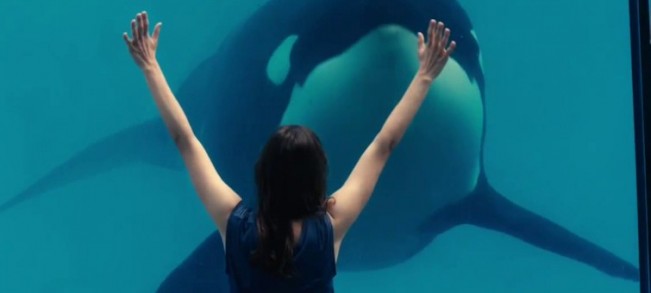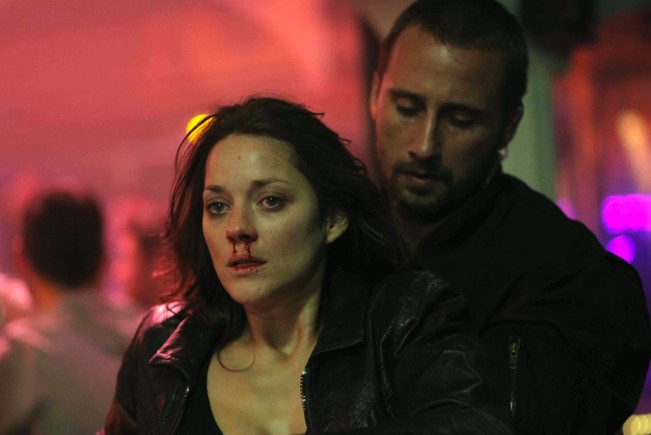By Jake Howell jake.howell@utoronto.ca
Cannes Competition Review: Rust and Bone
It’s rather fitting that Jacques Audiard’s Rust and Bone debuted today in the south of France, given that a large majority of the film was shot in and around Cannes. If you’ve never been to the sunny seaside town that is home to decades of cinema history, you might want to check out Audiard’s latest, as all the Festival icons are here: the blue turrets of the Hotel Carlton; the monolith that is the Palais des Festivals; and of course, la mer.
 Adapted from the Craig Davidson novel of the same name, Rust and Bone follows a budding romance between Ali and Stephanie, the latter being a trainer of killer whales and the victim of a tragic accident that leaves both her legs amputated. Thankfully, despite the plot summary of Rust and Bone sounding somewhat contrived, Audiard’s directorial competence ensures the final cut never feels artificial. Well, almost never: perhaps the only counterfeit aspect of the film is how the central romance begins, but when it does, Audiard treats his audience with the utmost respect and never forces emotion. Audiard’s contemporaries should be taking notes, as his films are master classes in exquisite pacing and exposition.
Adapted from the Craig Davidson novel of the same name, Rust and Bone follows a budding romance between Ali and Stephanie, the latter being a trainer of killer whales and the victim of a tragic accident that leaves both her legs amputated. Thankfully, despite the plot summary of Rust and Bone sounding somewhat contrived, Audiard’s directorial competence ensures the final cut never feels artificial. Well, almost never: perhaps the only counterfeit aspect of the film is how the central romance begins, but when it does, Audiard treats his audience with the utmost respect and never forces emotion. Audiard’s contemporaries should be taking notes, as his films are master classes in exquisite pacing and exposition.
In terms of the performances, you won’t find a better French, thirtysomething actress nowadays than Marion Cotillard, whose role as Rust and Bone’s Stephanie will surely receive awards nominations from all the heavy hitters, and deservedly so. I imagine playing a sexually-frustrated double amputee isn’t the easiest script out there to agree to, but Cotillard’s faith in Audiard’s good hands is fortunate for everyone watching. She sells the role, which is likely her bravest yet.

Likewise, expect Matthias Schoenaerts’ career to be elevated from “that guy in Bullhead” to something far more complex. Schoenaerts’ Ali is your typical Audiard male; quiet and reserved, perhaps even sensitive — but on the inside, aggression and survival instincts roil. Ali’s financial situation requires him to take whatever he can get, which ends up being brutal street-fighting in the back alleys of Nice. In other words, Ali’s fists are his meal-ticket, but they also play a part in the crucial irony of the film’s closing scenes. I won’t say much more than that, but it’s very clear there is a direct connection between a man with powerful hands and the now leg-less Stephanie. To summarize, this is a modern, non-traditional love story about broken human beings that have the will to fix each other. At times it’s shocking, but at others it’s funny: for example, Ali’s idea of courtship is destined to be immortalized in online clips or passing references. A delicate balance of trauma and levity is carefully exhibited here; the result of which is nuanced and fulfilling.
Cinema math doesn’t always work out, as putting a group of talented people together on a film set doesn’t guarantee success. However, something about Rust and Bone felt extremely promising from the very beginning. And how could it not? With Jacques Audiard as director, Alexandre Desplat on music, and Marion Cotillard and Matthias Schoenaerts as the lead actors, Rust and Bone was built on a foundation of proven greatness. And as it turns out, the sum total is a winner.















